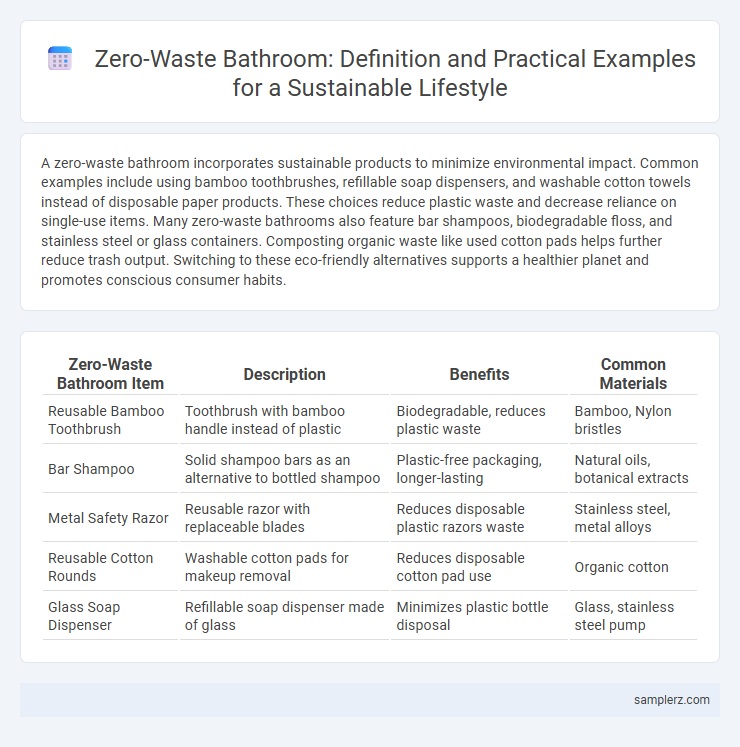A zero-waste bathroom incorporates sustainable products to minimize environmental impact. Common examples include using bamboo toothbrushes, refillable soap dispensers, and washable cotton towels instead of disposable paper products. These choices reduce plastic waste and decrease reliance on single-use items. Many zero-waste bathrooms also feature bar shampoos, biodegradable floss, and stainless steel or glass containers. Composting organic waste like used cotton pads helps further reduce trash output. Switching to these eco-friendly alternatives supports a healthier planet and promotes conscious consumer habits.
Table of Comparison
| Zero-Waste Bathroom Item | Description | Benefits | Common Materials |
|---|---|---|---|
| Reusable Bamboo Toothbrush | Toothbrush with bamboo handle instead of plastic | Biodegradable, reduces plastic waste | Bamboo, Nylon bristles |
| Bar Shampoo | Solid shampoo bars as an alternative to bottled shampoo | Plastic-free packaging, longer-lasting | Natural oils, botanical extracts |
| Metal Safety Razor | Reusable razor with replaceable blades | Reduces disposable plastic razors waste | Stainless steel, metal alloys |
| Reusable Cotton Rounds | Washable cotton pads for makeup removal | Reduces disposable cotton pad use | Organic cotton |
| Glass Soap Dispenser | Refillable soap dispenser made of glass | Minimizes plastic bottle disposal | Glass, stainless steel pump |
Eco-Friendly Swaps: Zero-Waste Toothbrushes and Toothpaste
Switching to zero-waste toothbrushes made from bamboo or other biodegradable materials significantly reduces plastic pollution in the bathroom. Eco-friendly toothpaste alternatives like toothpaste tablets or powders packaged in recyclable or compostable containers minimize single-use plastic waste. These sustainable swaps contribute to a low-impact lifestyle while maintaining oral hygiene effectively.
Sustainable Shower Essentials: Soap Bars & Shampoo Bars
Soap bars and shampoo bars eliminate the need for plastic packaging, significantly reducing bathroom waste. These sustainable shower essentials are often made from natural, biodegradable ingredients that minimize environmental impact. Switching to solid bars promotes a zero-waste lifestyle by cutting down on single-use products and encouraging a minimalistic approach to personal care.
Reusable Alternatives: Cloth Towels Over Paper Products
Using cloth towels instead of paper products in the bathroom significantly reduces waste and environmental impact by eliminating disposable paper towels and tissues. Reusable cloth towels made from organic cotton or bamboo offer durability, absorbency, and softness while minimizing landfill contributions. This zero-waste practice supports sustainable living by lowering paper consumption and reducing deforestation associated with producing single-use bathroom products.
Ditching Disposables: Menstrual Cups and Cloth Pads
Switching to menstrual cups and cloth pads significantly reduces bathroom waste by eliminating disposable products that contribute to landfill overflow. Menstrual cups, made of medical-grade silicone, are reusable for up to ten years, offering a sustainable and cost-effective alternative. Cloth pads, often crafted from organic cotton, can be washed and reused dozens of times, minimizing plastic waste and environmental impact.
Plastic-Free Storage: Glass Jars and Metal Containers
Using glass jars and metal containers for bathroom storage significantly reduces plastic waste by replacing disposable plastic bottles and containers. These sustainable alternatives are durable, reusable, and non-toxic, ensuring toiletries and personal care items are stored safely without releasing harmful chemicals. Embracing plastic-free storage solutions supports zero-waste goals while enhancing bathroom organization and aesthetic appeal.
Zero-Waste Shaving: Safety Razors and Natural Shaving Creams
Zero-waste shaving in the bathroom is exemplified by using safety razors made of durable metal, which significantly reduce plastic waste compared to disposable razors. Natural shaving creams, often packaged in recyclable or compostable containers, contain organic ingredients that minimize environmental impact while nourishing the skin. Together, these choices promote sustainable grooming habits that align with eco-friendly lifestyle goals.
Compostable Hygiene: Bamboo Cotton Buds and Silk Floss
Compostable hygiene products like bamboo cotton buds and silk floss offer sustainable alternatives to plastic-based bathroom essentials, significantly reducing landfill waste. Bamboo cotton buds decompose naturally within weeks, while silk floss provides a biodegradable option without harmful microplastics. Incorporating these eco-friendly items into daily routines supports a zero-waste lifestyle by minimizing environmental impact and promoting responsible consumption.
DIY Beauty: Homemade Face Masks and Scrubs
Creating homemade face masks and scrubs using natural ingredients like honey, oatmeal, and coconut oil reduces plastic waste and harmful chemicals found in commercial products. Incorporating zero-waste beauty routines promotes sustainability by eliminating excess packaging and utilizing biodegradable materials. This DIY approach enhances skin health while supporting eco-friendly lifestyle choices in the bathroom.
Bulk Buying: Refill Stations for Bathroom Supplies
Bulk buying through refill stations for bathroom supplies significantly reduces plastic waste by allowing consumers to purchase shampoo, conditioner, soap, and lotion in reusable containers. This zero-waste approach not only minimizes packaging waste but also encourages sustainable consumption patterns. Popular refill stations offer eco-friendly products with natural ingredients, promoting both environmental benefits and healthier lifestyle choices.
Minimalist Organization: Declutter with Sustainability in Mind
Minimalist organization in the bathroom promotes zero-waste by using reusable containers made from bamboo, glass, or stainless steel to replace single-use plastics. Sorting toiletries into designated, eco-friendly storage solutions helps reduce clutter and prevents unnecessary product accumulation, supporting sustainable living practices. This approach encourages mindful consumption and simplifies the space, making it easier to maintain an environmentally conscious lifestyle.

example of zero-waste in bathroom Infographic
 samplerz.com
samplerz.com